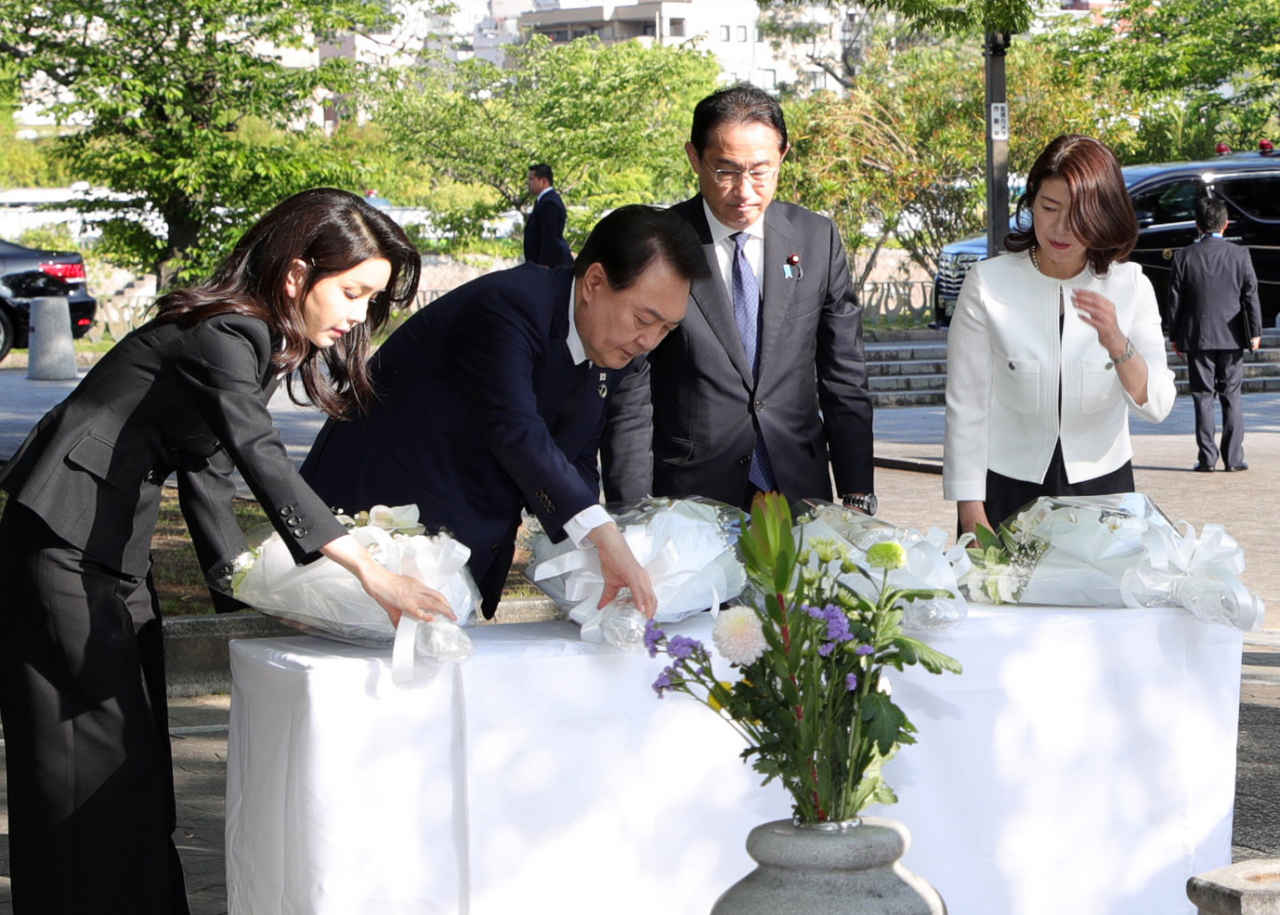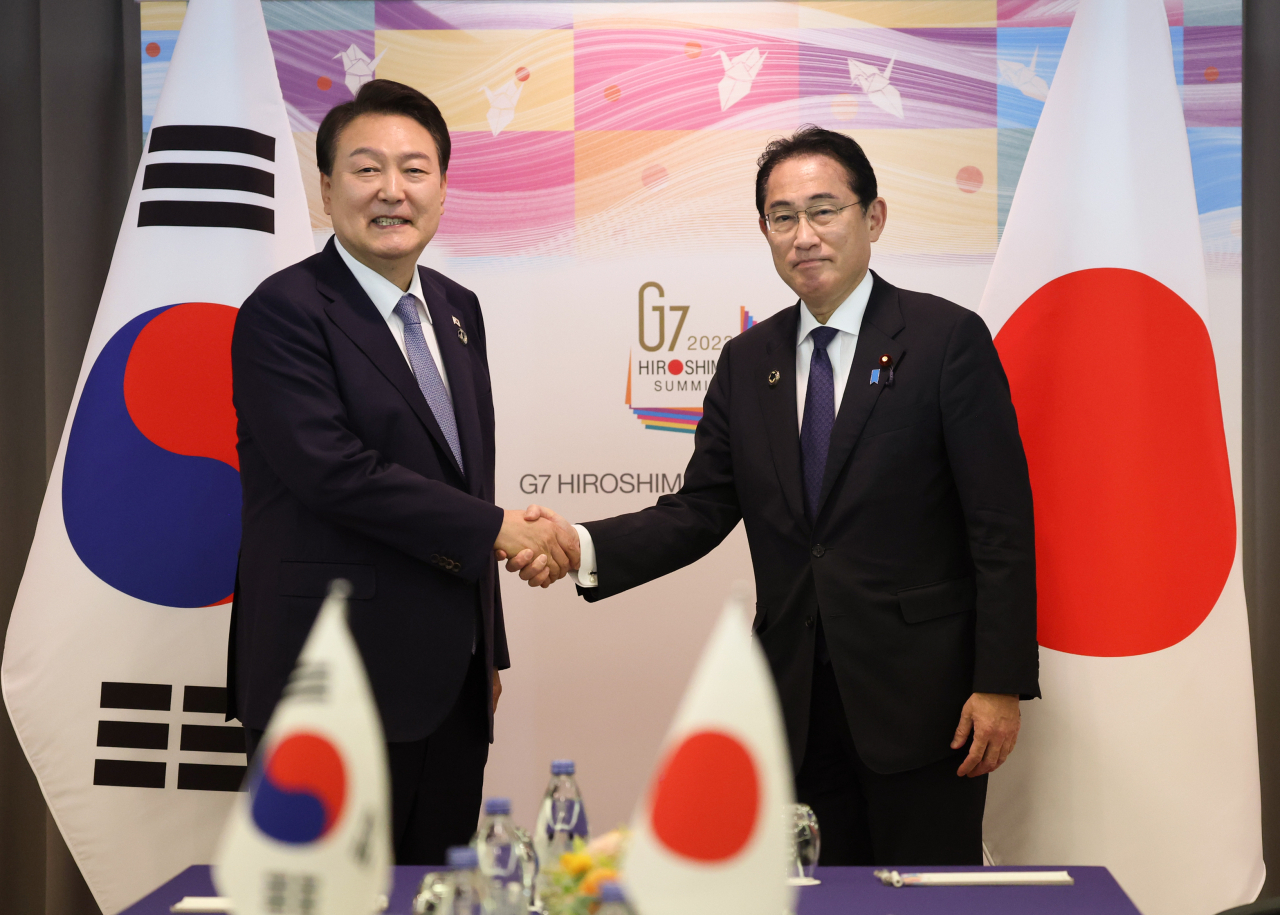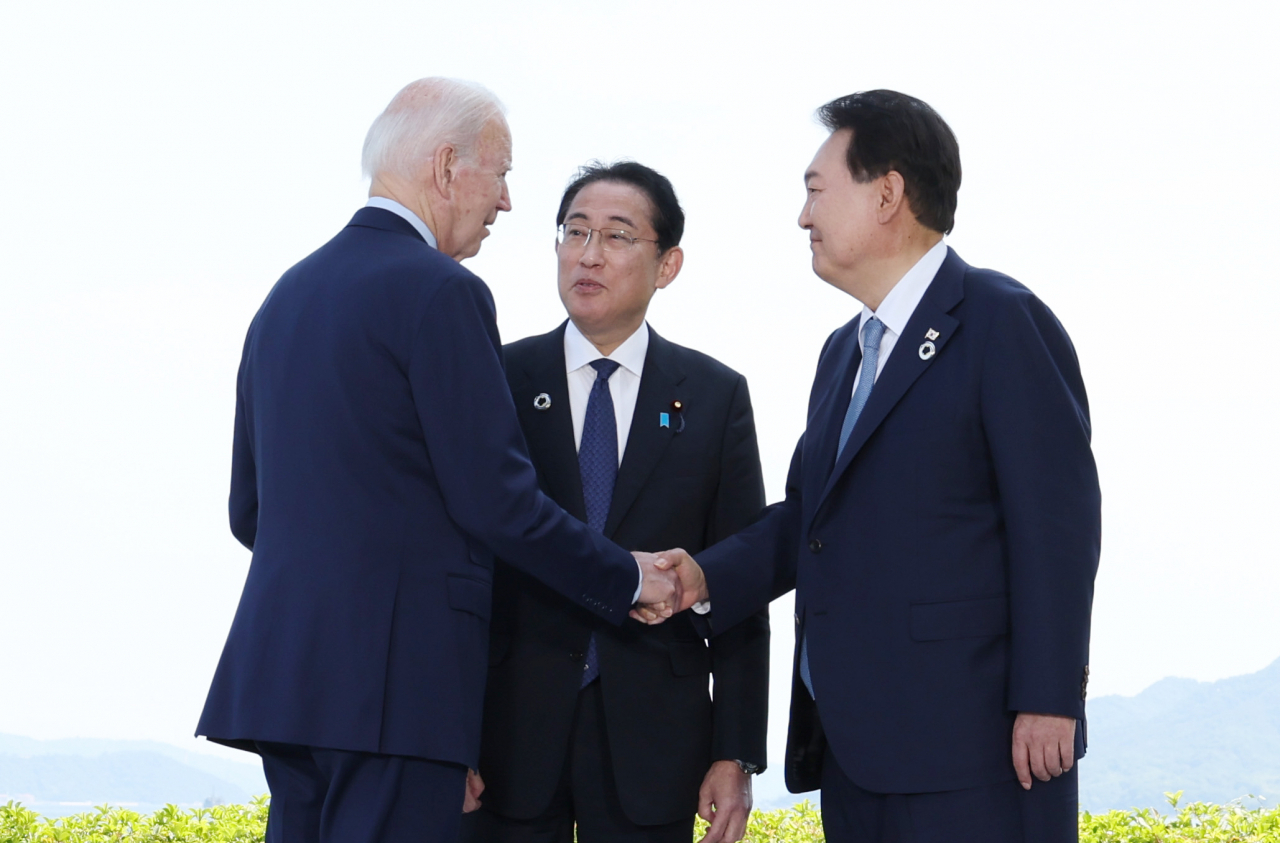Last on his itinerary, Yoon attended the third expanded session of the G-7 summit, where he urged the leaders to pay attention to “North Korea’s serious violation of international law.”
“Human rights violations committed by the North Korean regime are also crimes against humanity, and the international community should no longer turn a blind eye to them,” Yoon said. The poverty of the North Korean people is neglected and weakened as the regime invests all available economic assets in weapon of mass destruction, he said.
Leaders of South Korea and Japan on Sunday visited a cenotaph dedicated to the Korean victims of the 1945 atomic bombing in Hiroshima, Japan, for the first time in history, underscoring their shared commitments to honoring a "painful history" while forging a path toward a "peaceful future" in unison.
On the final day of the Group of Seven meeting held in the city where the first-ever use of an atomic bomb killed an estimated 200,000 civilians 78 years ago, South Korean President Yoon Suk Yeol and his Japanese counterpart Fumio Kishida, together with their wives, paid their respects to Korean victims at the Hiroshima Peace Memorial Park. The joint visit was attended by 10 Korean survivors of the bombing.
The joint visit to the memorial monument -- which comes amid years of strained bilateral relations over historic disputes -- was suggested by Kishida, according to Yoon's office. It was the first such visit for a South Korean leader and the second for a Japanese prime minister. Keizo Obuchi visited the memorial for the first time in 1999.
"Our visit together today will be remembered as a courageous act by Kishida to prepare for a peaceful future while conveying his condolences to the Korean atomic bomb victims,” Yoon said at a summit with his Japanese counterpart held after the visit.
In response, Kishida said, “I think it was a very important event for peace between Korea and Japan and for peace and prosperity in the world."
The monument serves as a memorial for more than 20,000 Koreans who died in the atomic bombing of 1945. Many of the Korean victims had been brought to Hiroshima as forced laborers.
The inscription on the tombstone erected across from the park in 1970 reads, "The number of Korean victims, representing 10 percent of Hiroshima's 200,000 citizen victims (who were killed), is a figure that must not be ignored."
At a summit held shortly after the visit, Yoon also thanked Kishida for “showing courage and determination” on expressing his "heartfelt sorrow" for the Korean laborers forced to work at Japanese companies during the country's 1910-1945 colonial rule of the Korean Peninsula during his visit to Seoul two weeks ago.
During the 35-minute summit with Kishida, Yoon emphasized the need to enhance close cooperation between South Korea, the US and Japan amid the escalating nuclear and missile threats posed by North Korea, according to presidential spokesperson Lee through a written briefing.
Yoon proposed the resumption of direct air routes, specifically highlighting routes to Hiroshima, to facilitate convenient travel and strengthen connectivity between South Korea and Japan.
This meeting marks the two leaders’ third since March. It follows a summit in Tokyo in March and another in Seoul earlier this month, leading the countries to declare a full resumption of "shuttle diplomacy.”
Following the summit, Yoon had brief trilateral talks with US President Joe Biden and Kishida where they discussed how to elevate their trilateral cooperation to a new level in the face of North Korea's illicit nuclear and missile threats.
According to reports citing a senior government official, Biden extended an invitation for another three-way meeting in Washington to continue discussions on bolstering the ties.
In particular, a scheme for sharing information on North Korea's missile launches among the three countries was discussed.
In a separate statement, the Korean presidential office said the leaders agreed to further strengthen strategic cooperation among the three countries not only to strengthen deterrence against North Korea, but also to solidify a free and open international order based on the rule of law.
The statement said they also agreed to deepen concrete cooperation in various fields, including trilateral security cooperation such as real-time sharing of North Korean missile warning information, strengthening trilateral cooperation in Indo-Pacific strategy and economic security.
Last on his itinerary, Yoon attended the third expanded session of the G-7 summit, where he urged the leaders to pay attention to “North Korea’s serious violation of international law.”
“Human rights violations committed by the North Korean regime are also crimes against humanity, and the international community should no longer turn a blind eye to them,” Yoon said. The poverty of the North Korean people is neglected and weakened as the regime invests all available economic assets in weapon of mass destruction, he said.
Leaders of South Korea and Japan on Sunday visited a cenotaph dedicated to the Korean victims of the 1945 atomic bombing in Hiroshima, Japan, for the first time in history, underscoring their shared commitments to honoring a "painful history" while forging a path toward a "peaceful future" in unison.
On the final day of the Group of Seven meeting held in the city where the first-ever use of an atomic bomb killed an estimated 200,000 civilians 78 years ago, South Korean President Yoon Suk Yeol and his Japanese counterpart Fumio Kishida, together with their wives, paid their respects to Korean victims at the Hiroshima Peace Memorial Park. The joint visit was attended by 10 Korean survivors of the bombing.
The joint visit to the memorial monument -- which comes amid years of strained bilateral relations over historic disputes -- was suggested by Kishida, according to Yoon's office. It was the first such visit for a South Korean leader and the second for a Japanese prime minister. Keizo Obuchi visited the memorial for the first time in 1999.
"Our visit together today will be remembered as a courageous act by Kishida to prepare for a peaceful future while conveying his condolences to the Korean atomic bomb victims,” Yoon said at a summit with his Japanese counterpart held after the visit.
In response, Kishida said, “I think it was a very important event for peace between Korea and Japan and for peace and prosperity in the world."
The monument serves as a memorial for more than 20,000 Koreans who died in the atomic bombing of 1945. Many of the Korean victims had been brought to Hiroshima as forced laborers.
The inscription on the tombstone erected across from the park in 1970 reads, "The number of Korean victims, representing 10 percent of Hiroshima's 200,000 citizen victims (who were killed), is a figure that must not be ignored."
At a summit held shortly after the visit, Yoon also thanked Kishida for “showing courage and determination” on expressing his "heartfelt sorrow" for the Korean laborers forced to work at Japanese companies during the country's 1910-1945 colonial rule of the Korean Peninsula during his visit to Seoul two weeks ago.
During the 35-minute summit with Kishida, Yoon emphasized the need to enhance close cooperation between South Korea, the US and Japan amid the escalating nuclear and missile threats posed by North Korea, according to presidential spokesperson Lee through a written briefing.
Yoon proposed the resumption of direct air routes, specifically highlighting routes to Hiroshima, to facilitate convenient travel and strengthen connectivity between South Korea and Japan.
This meeting marks the two leaders’ third since March. It follows a summit in Tokyo in March and another in Seoul earlier this month, leading the countries to declare a full resumption of "shuttle diplomacy.”
Following the summit, Yoon had brief trilateral talks with US President Joe Biden and Kishida where they discussed how to elevate their trilateral cooperation to a new level in the face of North Korea's illicit nuclear and missile threats.
According to reports citing a senior government official, Biden extended an invitation for another three-way meeting in Washington to continue discussions on bolstering the ties.
In particular, a scheme for sharing information on North Korea's missile launches among the three countries was discussed.
In a separate statement, the Korean presidential office said the leaders agreed to further strengthen strategic cooperation among the three countries not only to strengthen deterrence against North Korea, but also to solidify a free and open international order based on the rule of law.
The statement said they also agreed to deepen concrete cooperation in various fields, including trilateral security cooperation such as real-time sharing of North Korean missile warning information, strengthening trilateral cooperation in Indo-Pacific strategy and economic security.
Last on his itinerary, Yoon attended the third expanded session of the G-7 summit, where he urged the leaders to pay attention to “North Korea’s serious violation of international law.”
“Human rights violations committed by the North Korean regime are also crimes against humanity, and the international community should no longer turn a blind eye to them,” Yoon said. The poverty of the North Korean people is neglected and weakened as the regime invests all available economic assets in weapon of mass destruction, he said.
Leaders of South Korea and Japan on Sunday visited a cenotaph dedicated to the Korean victims of the 1945 atomic bombing in Hiroshima for the first time in history, underscoring their shared commitments to honoring a "painful history" while forging a path towards a "peaceful future" in unison.
On the final day of the Group of Seven meeting held in the Japanese city where the first-ever use of an atomic bomb killed more than 80,000 civilians 78 years ago, South Korean President Yoon Suk Yeol and his Japanese counterpart Fumio Kishida, together with the two nations’ first ladies, paid their respects to Korean victims at the Hiroshima Peace Memorial Park. The joint visit was attended by 10 Korean survivors of the bombing.
"This is the first case of the leaders of the two countries jointly paying their respects (to the Korean victims), and it is also the first time a Korean president has paid tribute at the cenotaph," Yoon said at a summit with Kishida held after the visit.
"Our visit together today will be remembered as a courageous act by Kishida to prepare for a peaceful future while conveying his condolences to the Korean atomic bomb victims,” he said.
The joint visit to the memorial monument -- which comes amid years of strained bilateral relations over historic disputes -- was suggested by Kishida, according to Yoon's office. It was the first such visit for a South Korean leader and the second for a Japanese prime minister. In 1999, Keizo Obuchi visited the memorial for the first time in 1999.
“I think it was a very important event for peace between Korea and Japan and for peace and prosperity in the world. At the same time, we will visit the memorial stone with other leaders and have many conversations,” Kishida said.
The monument serves as a memorial for approximately 20,000 Koreans who were brought to Hiroshima as forced laborers and died in the atomic bombing of 1945. It was erected across from the park in 1970, and moved on to the park grounds in 1999.
The inscription on the tombstone reads, "The number of Korean victims, representing 10 percent of Hiroshima's 200,000 citizens, is a figure that must not be ignored."
At a summit held shortly after the visit, Yoon also thanked Kishida for “showing courage and determination” on expressing his "heartfelt sorrow" for the Korean laborers forced to work at Japanese companies during the country's 1910-1945 colonial rule of the Korean Peninsula, during his visit to Seoul two weeks ago.
During the approximately 35-minute summit with Kishida, Yoon emphasized the need to enhance close cooperation between South Korea, the US and Japan amid the escalating nuclear and missile threats posed by North Korea, according to presidential spokesperson Lee through a written briefing.
Yoon proposed the resumption of direct air routes, specifically highlighting the Korea-Hiroshima route, to facilitate convenient travel and strengthen connectivity between South Korea and Japan.
Yoon also said he hoped the two countries would bolster their cooperation on the global agenda, including economic security based on the results of the G-7 summit. Kishida also said their three meetings in two months are an indication of progress in bilateral relations. This meeting marks the two leaders’ third since March. It follows a summit in Tokyo in March and one in Seoul earlier this month, leading the countries to declare a full resumption of "shuttle diplomacy.”
Presidential spokesperson Lee Do-woon later told reporters in Hiroshima that the leaders' visit accompanied by Korean victims also signifies that the two countries are committed to addressing the evolving nuclear threats posed by North Korea.
"Their joint visit also signifies that the two leaders and the two countries, together with their ally the United States, will respond to nuclear threats in Northeast Asia and, by extension, the international community," Lee said.
On the final day of G-7 meeting, US President Joe Biden invited Yoon and Kishida for a three-way summit in Washington.
According to a senior US official, during a trilateral meeting among Korea, the US and Japan which took place following a bilateral summit between Yoon and Kishida, Biden extended an invitation for another meeting in Washington to continue the discussions and strengthen cooperation among the three nations.
After the meeting, the White House issued a statement saying the leaders discussed how to take their trilateral cooperation to new heights, including coordination in the face of North Korea's illicit nuclear and missile threats. In particular, a scheme for sharing information on North Korea's missile launches among the three countries was discussed.









![[Today’s K-pop] Blackpink’s Jennie, Lisa invited to Coachella as solo acts](http://res.heraldm.com/phpwas/restmb_idxmake.php?idx=644&simg=/content/image/2024/11/21/20241121050099_0.jpg)
